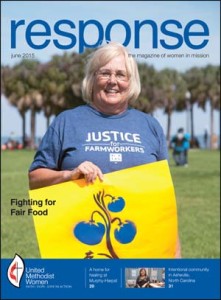 Responsively Yours: Creative, Supportive, Global Fellowship
Responsively Yours: Creative, Supportive, Global Fellowship
Harriett Jane Olson, General Secretary & CEO
United Methodist Women National Office
Going from the Northern Hemisphere to the Southern Hemisphere in January and February means going from winter to summer. Both times I did so this year I arrived bleary-eyed and uncomfortable in clothes that were not really warm enough in New York and too warm in Chile and in Mozambique. And both times I was greeted by welcoming women who are part of our global sisterhood of grace. What a privilege to represent your love to them and their love to you!
Through Ubuntu journeys, Assembly and other settings when Methodist women from around the world meet, we experience that sisterhood. And, like someone at a family reunion, we sometimes ask: How are we related again?
United Methodist Women claims a side-by-side role with United Methodist Women in the Central Conferences. Ours is not a staff or board that has governance over the work of the Zimbabwe United Methodist Women or the Women’s Society of Christian Service in the Philippines — we come to the table as partners.
Just like at a family reunion, we need to look back to understand the relationship.
Until the 1960s our predecessors sent missionaries and deaconesses to serve around the world. The growing global churches began to engage in conversations with the sending churches that forever changed the nature of the missionary work. Some became autonomous churches or part of a uniting church, and some remain in one United Methodist Church together. In 1964 the mission-sending work became centralized in the General Board of Global Ministries.
In the 1980s this began to change, with the other general agencies being first allowed and then asked to think about their work more globally. In the 1990s United Methodist Women held a series of Working Conferences around the world to assess its global relationships. From these meetings we developed the plan for a new category of worker called “regional missionary.” These missionaries are recruited, trained and supported by women in the United States, but their assignment is to engage in women’s leadership development in large world regions, some that are Central Conferences and others that are not.
Now, with regional missionaries and leaders of the World Federation of Methodist and United Church Women participating in our program advisory group, we are restating our desire for sister-to-sister relationships. Both in Chile and in Mozambique the family resemblance was clear among the women praying, singing, learning, serving and committed to making a difference in their communities. We are learning from one another, supporting one another, pooling resources and drawing expertise from one another.
This is creative, supportive fellowship writ large!
Harriett Jane Olson
General Secretary
United Methodist Women